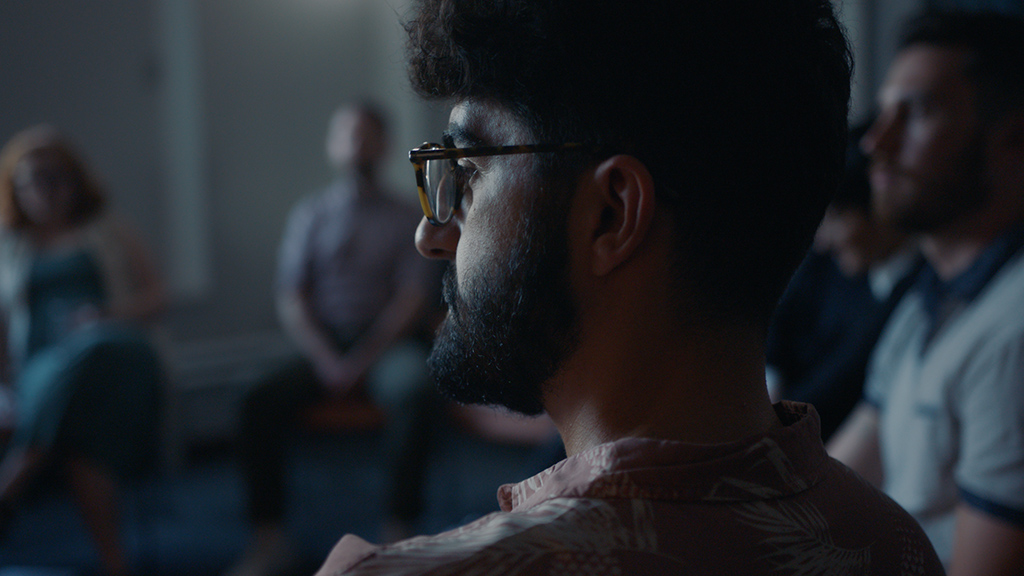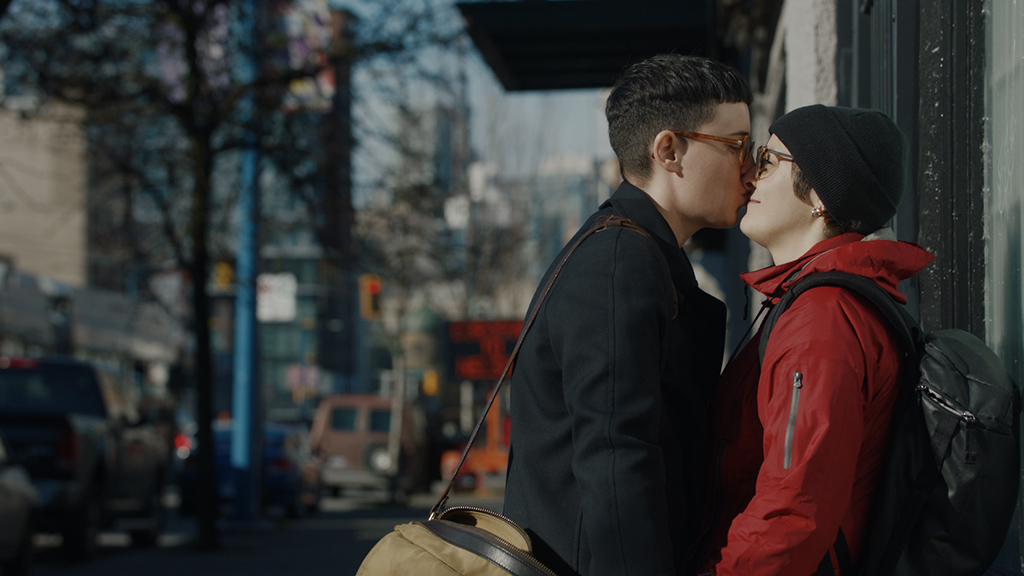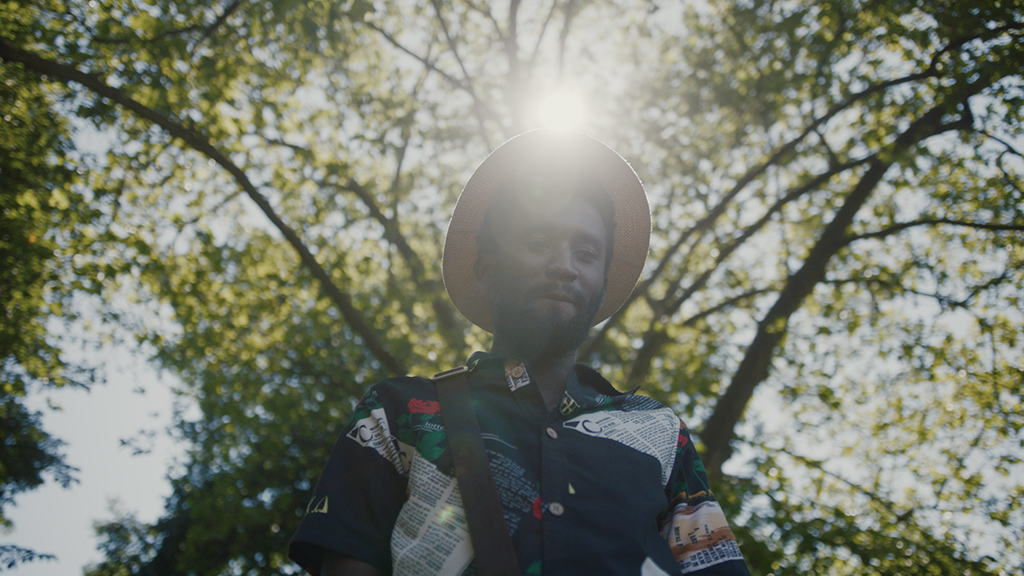“Let me tell you one thing. If you have everything but you don’t have freedom, you’ll never enjoy,” says Drake, the subject of the new documentary, Someone Like Me, which won a $10,000 Rogers Audience Award this month at Toronto’s Hot Docs Canadian International Documentary Festival. “Canada has the freedom. The rest will come later.”
Drake is a young gay Ugandan man, brought to Canada through Vancouver’s Rainbow Refugee community group, an organization that helps LGBTQ2S+ people escape persecution to Canada. As part of Rainbow Refugee’s sponsorship program, which also expedites a refugee claim through federal bureaucracy, a small group of Vancouverites assembles to fundraise for Drake and support him through his first year in a new country. However, facing the real pressure of helping a human being through loss, transition and acclimatization to a new culture, the circle soon falls apart, leaving responsibility for Drake in the hands of a young immigration lawyer, Kay, and the few other volunteers who make it through the first full year.
The tension and ambiguity at the heart of Someone Like Me, the first feature-length documentary from directing duo Sean Horlor and Steve J. Adams, is between “freedom” and all “the rest” that we hope will come later. We experience the joy and liberation of Drake’s escape from his traumatic past, hear him break down in tears in a voice recording when he hears he has been chosen for resettlement and listen to him wince and evade the memory of a broken tooth he suffered in Uganda. The doc offers few details of his life in Uganda, a country which this spring passed a bill that prescribes a five-year-jail term for anyone guilty of same-sex acts (though it still needs the signature of President Yoweri Museveni).
At the same time, we see the disappointment of Drake’s arrival in Canada as he struggles to find a job in his field, deals with the stress of isolation and mourns the loss of the food he used to eat at home, among other things.
The challenge of the film is to not look away from either side; not to collapse Drake’s journey into a simple narrative about freedom or loss, salvation or hubris.
It’s tempting for viewers to jump to one of two conclusions: Either Drake was rescued through a beautiful act of grace and charity by well-meaning if imperfect Canadians, or he was let down by a fragile group of privileged saviours who were unable to handle their own discomfort with genuine trauma or lucidly face the failures of their own society.
It would be easy if Someone Like Me were either a feel-good story or a moral cautionary tale. But it’s neither.
It’s true that the circle of about eight volunteers helping Drake reach Canada are heroes, as they’re described by Adam Koussa, the staff member at Rainbow Refugees who works with them. Although many of them were strangers before they were brought together to sponsor Drake, they step up to dedicate time, money and effort to save a life from persecution when they could easily have looked away. And they succeed.

Credit: NFB
But the circle is also obviously flawed. When Koussa gently asks the volunteers if they are strong enough to handle the demands of a 22-year-old refugee, they ignore him, deciding that creating a life in a big city is a “young man’s game.” Drake turns out to be, as most people are, a complex and imperfect human. When some members of the circle perceive his celebration on arriving in Canada, and his use of alcohol and cannabis, to be out of hand, they fight about whether to intervene, which leads to a rift in the group. As much as the volunteers try to prepare themselves for a refugee’s emotional and psychological reality, they are not prepared enough.
With a remarkable LGBTQ2S+ refugee program and two major queer refugee support organizations, Canada’s contribution to helping queer people around the world is in some ways unparalleled. To see our country through Drake’s eyes is to see a kind of freedom, dignity and autonomy that Canadians often take for granted, or forget in the hubbub of everyday politics.
Yet Someone Like Me also holds up a harsh mirror to Vancouver’s scarce housing and employment, its racism and poverty, as well as—later—the isolating impact of the COVID-19 pandemic. We watch the volunteers in Drake’s circle struggle themselves with all the trials of being a young person in the city, even as they try to help Drake find his own footing. While helping Drake try to find work in his field as a fashion designer, circle member David himself settles for a job he dislikes as a phone operator. Meanwhile, Kay supports Drake to find queer community in Vancouver, sharing their own experience being escorted out of a high-school bathroom for looking too masculine.
“What has Drake lost by dislocating himself from his own culture and homeland, even if that exchange might have saved his life?”
When we watch Drake’s genuine joy at coming to Canada and the unfolding of his personality and self-expression in a culture that doesn’t suppress it, it feels like a miracle. Near the end of his first year in Canada, he maintains optimism, hope and faith in the future. But the film also leaves us with some difficult questions. What has Drake lost by dislocating himself from his own culture and homeland, even if that exchange might have saved his life? Why do we rely on the kindness and charity of individual Canadian volunteers, many from our own queer community, to raise money to help refugees in danger around the world rather than have governments do this work? How do we reconcile our success in accepting a few of the refugees who apply to programs such as Rainbow Refugee and Toronto-based Rainbow Railroad with our failure to help the hundred times as many who are equally desperate?

Credit: NFB
If people who want to do good in an imperfect and complex world are to learn anything from Someone Like Me, it’s that all of these contradictions have to be held at once. It would be a tragedy to take the film as a reason not to help, to descend into self-critical cynicism or to demand universal change before ever lifting a hand to help someone in need. If anything, it’s an inspiration to redouble our efforts. But it would also be a mistake if we didn’t take the opportunity to look harder and deeper at ourselves, to cast out the beam from our own eye before plucking the mote from our brother’s—to ask, for example, how far we are really willing to go to respect the autonomy of someone we are trying to help.
With the inevitable constraints of documentary filmmaking, exacerbated by the limitations of the pandemic, there is a lot we don’t get to see in Someone Like Me. We don’t see much of the disagreement that breaks the circle of volunteers apart or Drake’s life leading up to his move to Canada or the subtle racism that deeply impacts him after he arrives.
We also don’t get to see what happens next, as immigration lawyer Kay prepares to form a new circle to sponsor another refugee—this time perhaps more experienced, careful and confident than before.
Someone Like Me is streaming across Canada now until May 16 with Vancouver’s DOXA Documentary Film Festival. DOXA will livestream a Q&A with directors Sean Horlor and Steve J. Adams and special guests on Thursday, May 13 at 7 p.m. The film also streams in Alberta with Edmonton’s NorthwestFest, also until May 16.


 Why you can trust Xtra
Why you can trust Xtra


